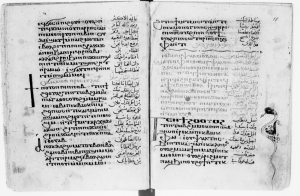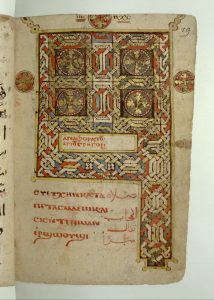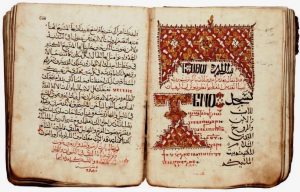Part 4 – What other factors have contributed to pronunciation issues?
Since the entry of the Arabs into Egypt, the use of the Coptic language has progressively declined. With the exception of a few towns and small groups of people, its use is now limited to liturgical practice for the hymns of the Church. The hymns were entrusted to cantors, more prominently known as “muallemeen”, who spent their lives teaching and orally handing down the Church’s musical tradition. Many of these cantors had special musical talents to compensate for their loss of sight, and a number of them were extremely blessed people. However, these cantors are the second major reason for the confusion in the pronunciation of Coptic. Why?
A. The level of education the cantors acquired limited their linguistic ability. Generally, the more educated you are, the better your pronunciation and grammar skills will be. According to the CIA World Factbook, Egypt ranked 166th out of 215 countries with only 73.9% of its population over the age of 15 being able to read and write in 2015. Now consider what the conditions might have been for blind children from poor areas more than 50 years ago. There were a few exceptions to this scenario, where the cantor was educated even though he was blind, or was not blind at all. These cantors will be of utmost importance to this study.
B. Their geographic location determined who they learned from, what they learned, and what pronunciation they used. Until Ragheb Moftah created the Higher Institute of Coptic Studies, standardization of hymns did not exist. Each town had its own local hymns, along with various renditions of more common hymns, and even cantors in the same church had different ways of saying the same hymns. And that is okay! (within limits of course). That being said, there wasn’t a demand from the cantors to be 100% accurate in their pronunciation and/or in their handing down of the hymns.
I want to take the time to use some specific examples of words that have caused a great deal of controversy in the past few years.
- :amiof The old pronunciation for this word would be “Tam-yof” whereas the correct pronunciation in the ‘reformed’ sound would be “thamyof”. However, we see that in the psalm Allylouia Vai pe piehoou during the liturgy it has been pronounced “tha-mey-yoff”.
In order to point out what is accurate and what is not, we have to look a bit deeper. I will share two older recordings of the hymn, the first by Abouna Shenouda Maher in the old pronunciation, and the second by Cantor Habib Hennawy one of the most prominent cantors of Upper Egypt.
Abouna Shenouda Maher
Cantor Habib Hennawy – Two important things to note in this recording: 1) There is someone reading the words for the cantor because he is blind. This was a practice that was done during the chanting of many hymns, especially the psalms during vespers, matins and liturgy; 2) You can clearly hear the muallem correct the pronunciation of the person reading, fixing thameyyof to thamyof.
Now that these recordings have been made available, we can see that pronouncing the words correctly has not been something uncommon. Keep in mind that both of the people in the previous recordings were taught by Cantor Mikhail in person. It is not uncommon in music to break a vowel’s pronunciation if needed. However, when there are several vowels, there is no reason for the word to be pronounced incorrectly. We see this word in many other hymns. Here are a few examples and recordings
Fourth Hoos (Praise)
Cantor Sadek Attallah and Cantor Bibawy
Higher Institute of Coptic Studies while Ibrahim Ayad was present with them (1970s or so)
Cantor Farag Abdelmessih
For the sake of time I will not add any more recordings on this subject unless necessary.
2. Allylouia – This is one of the most common words used in the Orthodox Church and our Coptic Church has hundreds of hymns that include it. In fact, we have a hymn that is solely the word Alleluia for thirty minutes! The correct pronunciation of the word is “alleluia” with a soft “a” like the word “man” or “have”. Some cantors have recorded hymns wherein they use the hard “A” sound, yet those same cantors record it in different hymns with the correct sound. Here are some examples of Cantors who have recorded it correctly, even in hymns that are now commonly using the incorrect sound.
A. Cantor Habib Hanna of Alexandria – Psalm 151 – Anok pe pikouji
B. Cantor Tawfik Youssef – Eulogimenoc
C. Cantor Mikhail Girgis el Batanouny – He is extremely interesting because he used to pronounce it both ways. Here are two recordings to show that:
Psalm 151 – notice how he also says “thamyo”
Aspazmos Watos Gregorian Liturgy Library of Congress tapes – notice how they end the Cherubic praise like the ending of Great Aspazeste. This shows that nothing was really standard. It also may have something to do with why we call the Watos Aspazmos a greeting even though the greeting happens after the Reconciliation Prayer.
There does not seem to be any reason to pronounce this word incorrectly, since 90% of the hymns that include it pronounce it correctly. This can either mean that the person who created the other 10% added that sound there for whatever reason, or over time other cantors added it.
3. Carx the word sarx, a greek loan word meaning flesh, is also a very common word, mostly following the word af[i. The two words together mean “took flesh”. There are two things I’d like to mention: the first is the correct pronunciation in old coptic is “Af-shi”, whereas the change caused it to be “Af-chi”. Because the Egyptians have a hard time pronouncing those three letters in a row, they made it into something like “af-et-chi”. The same goes for the word et[oci. The concept here also applies to the word carx. For many Egyptians it was difficult to pronounce those three consonants together, so they made it into “sarex”. Here is where I would like to mention Cantor Wissa Attia Ghabrial of Luxor, who was in my opinion the most talented of his time. He was learned in French, Arabic and Coptic, and was able to pronounce many of these difficult words correctly:
A. Cantor Wissa – Aretenthounti (Notice that he also pronounces oubrostatis, not ou eb rostatis)
B. Cantor Wissa – Shere Maria (Listen to how he corrects himself) – if you want this recording please message me. I know it’s beautiful!
C. Cantor Thomas Agaiby of Luxor
D. Fr. Mettias Nasr Mankarious – For Higher Institute of Coptic Studies
E. Fr. Marcos Girgis of Mattia – et[oci- Higher Institute of Coptic Studies St. Basil Liturgy (This clip is wonderful)
4. Kurioc The Greek word for Lord
Cantor Mikhail – Anaphora of St. Basil with Cantor Sadek
5. Omooucioc – of one essence
Cantor Mikhail – From the Great Exposition
These recordings prove that the pronunciation of Coptic in the hymns has changed depending on how educated the cantors who chanted them were. It also shows that the changes that are occurring now are not recent developments, but are a fix enabling us to move forward with standardizing the pseudo-coptic and completely following its rules instead of proverbially having “one leg in and one leg out”. I hope this has relieved some confusion.


